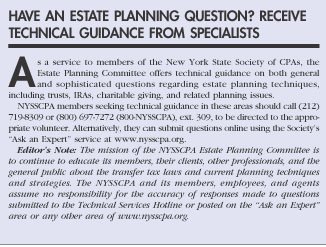

ESTATES AND TRUSTS
January 2003
Generation-Skipping Transfers
By Edward Mendlowitz, Mendlowitz Weitsen LLP CPA
 Generation-skipping
transfers (GST) are gifts or bequests to beneficiaries two or more generations
removed from the donor or decedent (e.g., from a grandparent to a grandchild).
The tax is a flat and 50% in 2002 and 49% in 2003 on all such transfers and
is payable upon the death of the transferor, in addition to the estate tax.
There is a $1.1 million GST exemption in 2002 and 2003. The $11,000 annual
exclusion, and direct payments of medical and educational bills are also exempt
from the GST tax.
Generation-skipping
transfers (GST) are gifts or bequests to beneficiaries two or more generations
removed from the donor or decedent (e.g., from a grandparent to a grandchild).
The tax is a flat and 50% in 2002 and 49% in 2003 on all such transfers and
is payable upon the death of the transferor, in addition to the estate tax.
There is a $1.1 million GST exemption in 2002 and 2003. The $11,000 annual
exclusion, and direct payments of medical and educational bills are also exempt
from the GST tax.
The following example compares a bequest and gift of $1 million to a grandchild, assuming that the estate, gift, and GST tax rate is 50% and that there are no available GST exemptions. The estate tax is inclusive, or part of the bequest, while the gift tax and GST tax are tax exclusive, meaning that the transfer is net of the tax. In the case of bequests, the GST tax is calculated on the net amount passing to the grandchild, reduced by the estate tax and the GST tax. In the case of gifts, the gift tax is calculated as 50% of the amount passing as a gift, and the GST tax is calculated as 50% of the net amount to the grandchild.
Bequest |
Gift |
|
| Amount to be disposed of | $1,000,000 |
$1,000,000 |
| Less estate tax | –500,000 |
n/a |
| Less gift tax | –166,667 |
–333,333 |
| Less GST tax | –222,222 |
|
| Net to grandchild | $333,333 |
$444,444 |
The Economic Growth and Tax Relief Reconciliation Act of 2001 changed the election and allocation of the GST exemption. Previously, the exemption had to be specifically elected and applied, which could have led to disastrous effects in situations where it was inadvertently omitted, such as for a life insurance trust for multiple grandchildren with a premium less than the total annual exclusions. In this situation, a gift tax return did not have to be filed, but the transfer did not qualify for the GST tax exemption unless it was. If such an exemption were not claimed, then the entire life insurance proceeds was considered a GST and taxed accordingly.
The 2001 Tax Act creates a presumption that the GST exemption is automatic unless the taxpayer elects out of it. This presents a different set of issues, with serious consequences.
Under the 2001 Tax Act, every gift must be reviewed with the GST exemption in mind. Many gifts to trusts with children as primary beneficiaries and grandchildren as secondary beneficiaries create the possibility that the grandchildren will inherit some of the assets. Even though in most situations the GST exemption would not be claimed, under the present law it would be automatically applied. An election must be made not to apply it. If there are life insurance policies and the GST exemption has been applied automatically, and if the policy is subsequently terminated, all the claimed exemptions will have been wasted.
Every nondirect gift must now be carefully reviewed and examined to determine if it might become a GST upon the donor’s death. Then the decision must be made on a timely filed gift tax return to keep the automatic GST exemption or to elect out of it.
When incorrect allocations of GST exemption occur, the IRS may grant a retroactive allocation rather than a corrected allocation on a newly filed gift tax return. This retroactive allocation would be beneficial where the current value is substantially greater than the date-of-gift value.
The IRS has issued guidance on applying for a retroactive allocation in Notice 2001-50. Requests for extensions to make the GST allocation will be considered, but these requests must be made before the IRS raises the issue (e.g., in an audit). A problem would also arise if a donor dies during the period the beneficiary of a large life insurance policy is waiting for an IRS response, and the relief is subsequently denied. Because no late allocation was made, the full face of the policy might be considered a GST, rather than just the premiums paid.
Many wills that contain credit shelter formula provisions leaving an amount up to the GST exemption credit to beneficiaries may also have unintended results. For example, a will that may have been executed when the maximum exemption was $1 million should be revisited now that the exemption could be as high as $3.5 million.
Editors:
Mitchell A. Drossman, JD, CPA
U.S. Trust Company of New York
Robert L. Ecker, JD, CPA
Ecker Loehr Ecker & Ecker LLP
Contributing Editors:
Peter Brizard, CPA
Jeffrey S. Gold, CPA
J.H. Cohn LLP
Ellen G. Gordon, CPA
Margolin Winer & Evens LLP
Jerome Landau, CPA
Lawrence M. Lipoff, CPA
Weinick Sanders Leventhal
& Co., LLP
Harriet B. Salupsky, CPA
Debra M. Simon, MST, CPA
The Videre Group, LLP
Richard H. Sonet, JD, CPA
Marks Paneth & Shron LLP
The CPA Journal is broadly recognized as an outstanding, technical-refereed publication aimed at public practitioners, management, educators, and other accounting professionals. It is edited by CPAs for CPAs. Our goal is to provide CPAs and other accounting professionals with the information and news to enable them to be successful accountants, managers, and executives in today's practice environments.
Visit the new cpajournal.com.